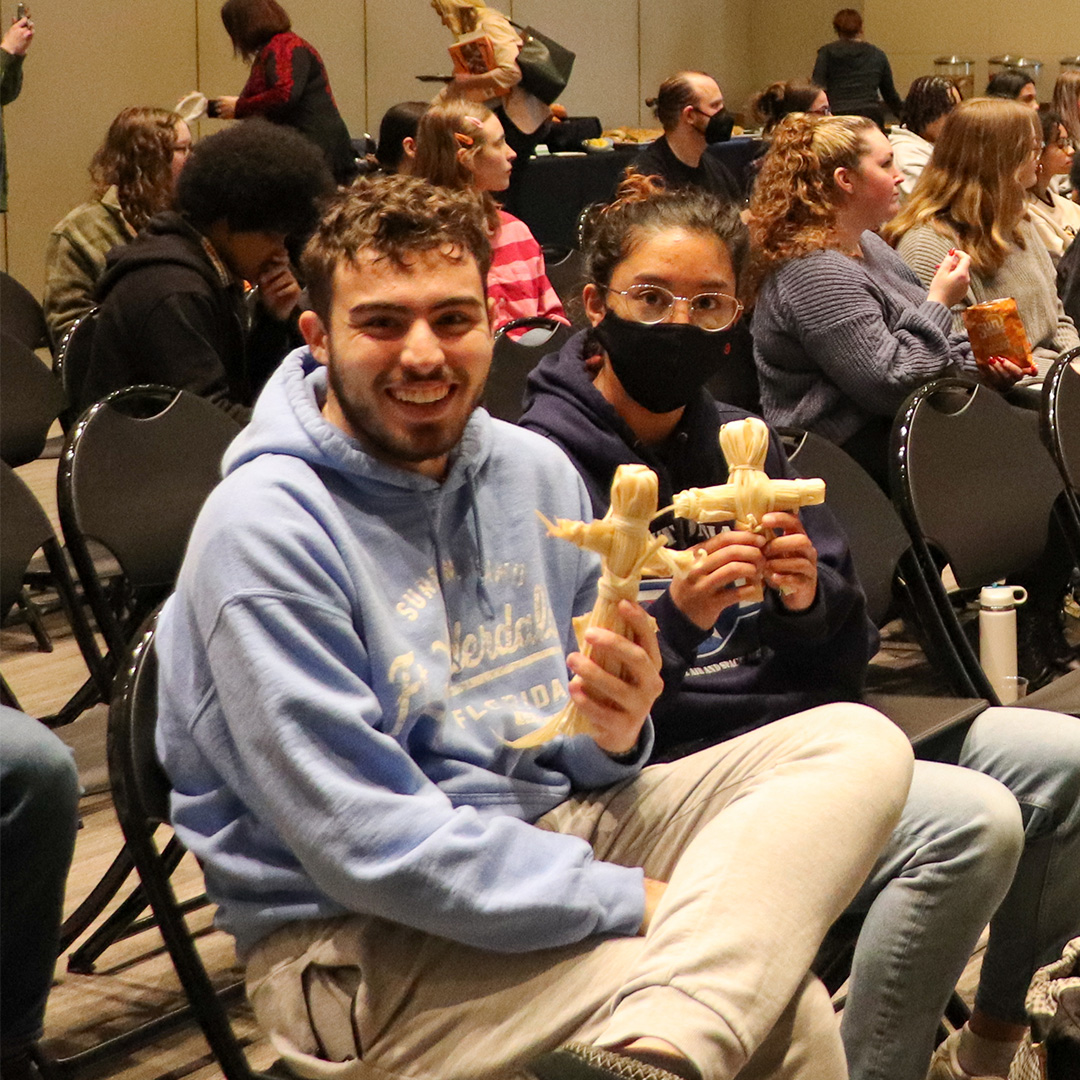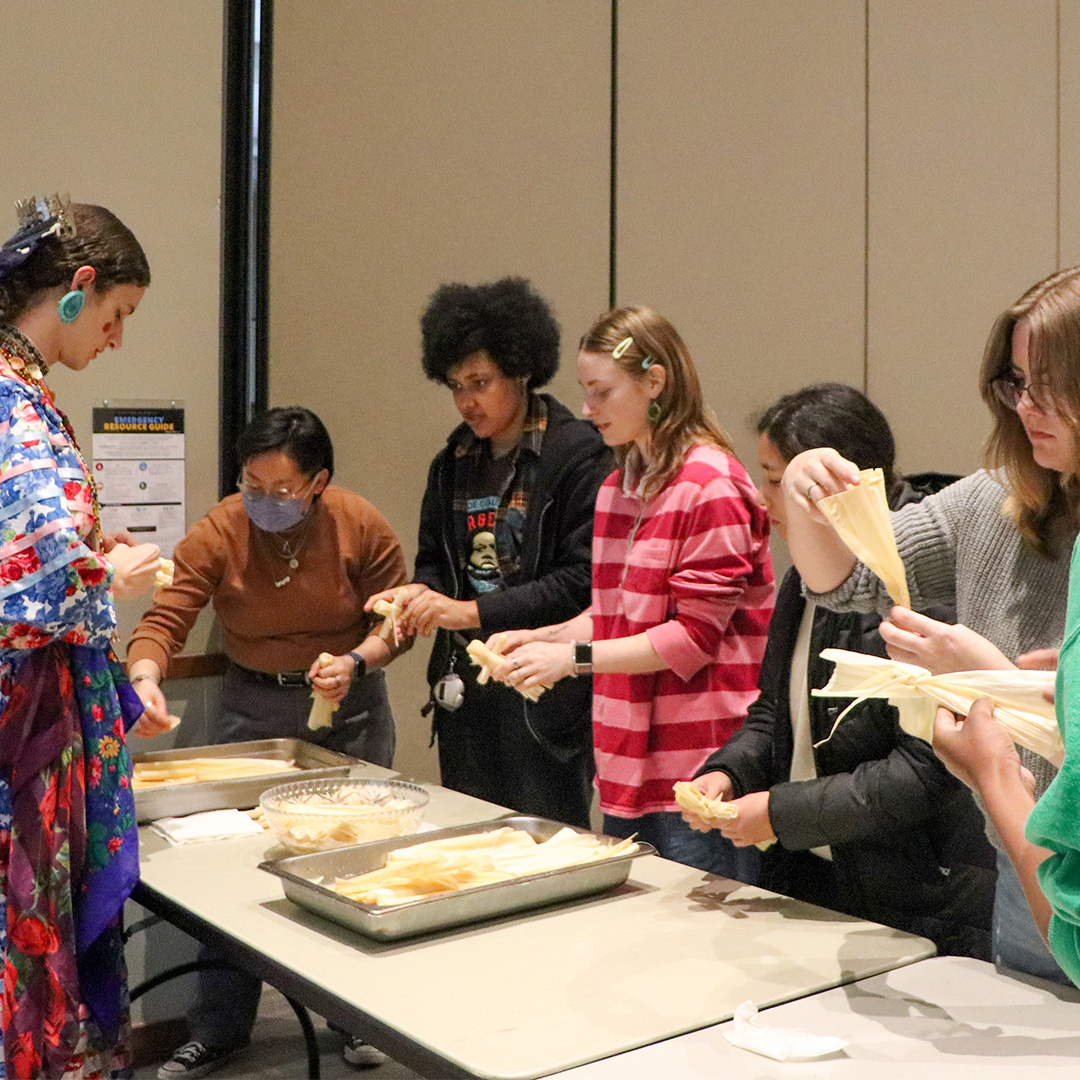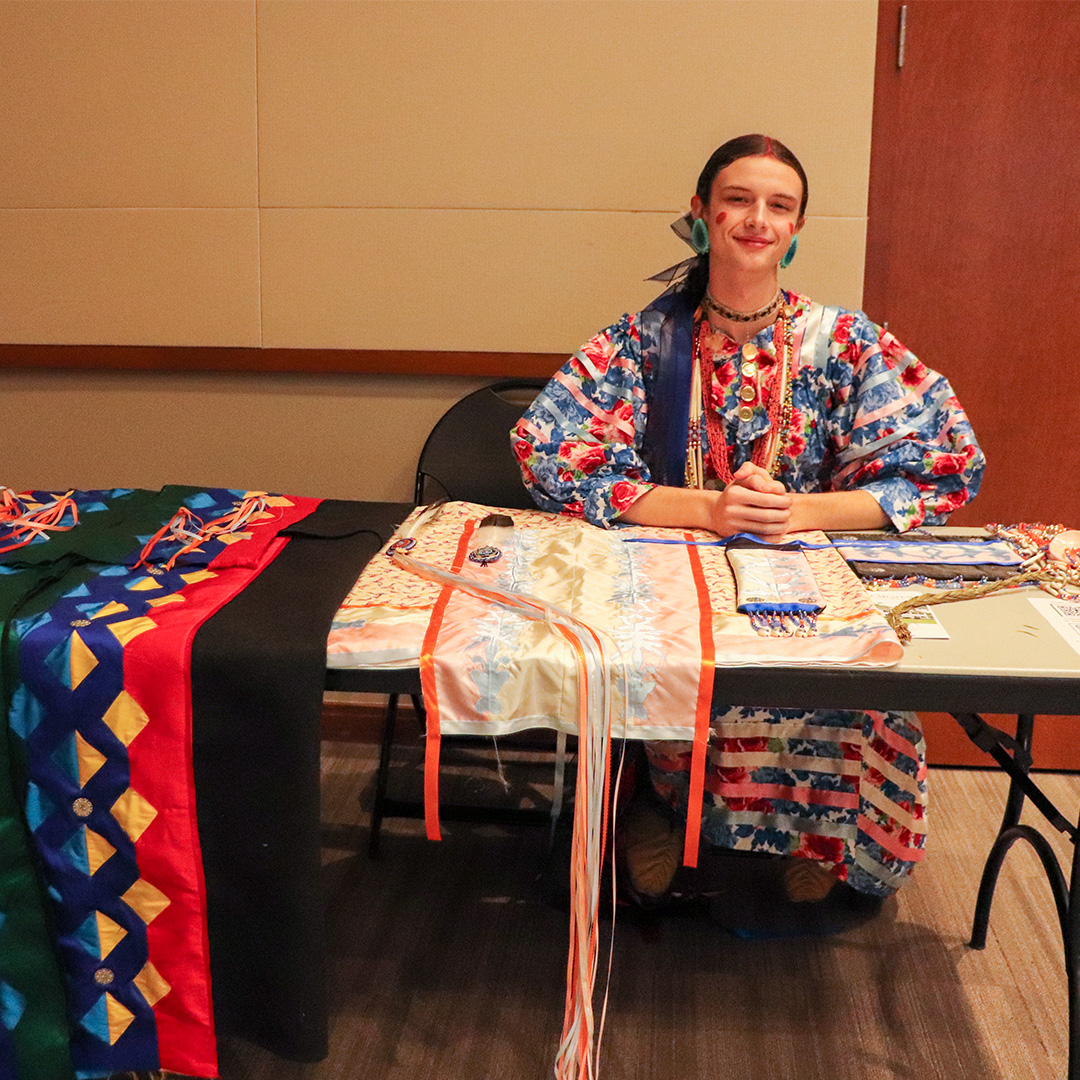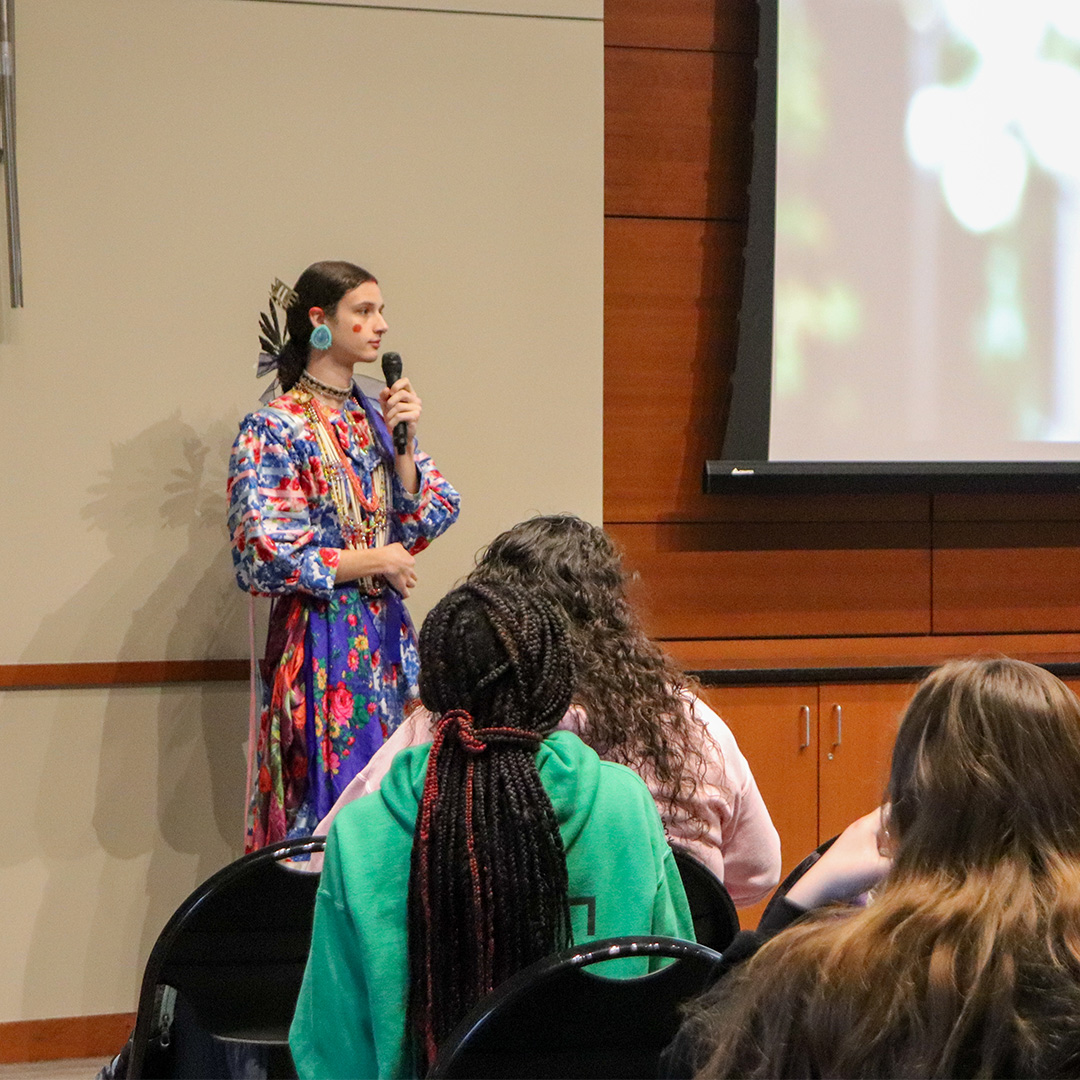River Florence Webb
Van Nhi Ho, a graduate coordinator for the Women’s Gender & Sexuality Center, hosted a “2-Spirit Social” on Feb. 7.
The Social provided the opportunity for students to learn and celebrate the 2-Spirit community within the Indigenous culture. Students also got to visit tables that included Kaleidoscope of the Center for Family Services, a support group for LGBTQ+ young adults, and the Museum of Cape May County.
The keynote speaker and presenter, River Florence Webb is a Nez Perce and Meskwaki Two-Spirit, recognized by members of their (Nez Perce) tribe as a traditional scientist and knowledge keeper due to their efforts in preserving Titooqatímt, the Nez Percelanguage.
In acknowledgment of the Lenni Lenape Tribe of Galloway, River wore their Meskwaki camp dress since the Meskwaki are an Algonquian people, like the Lenni Lenape. Below are some of the topics they discussed.
"I say that 2-Spiritness is a spiritual role, gender identity, cultural role, sexual orientation and so much more... You cannot quantify being 2-Spirit."
Explaining the term “2-Spirit”
It can be incredibly hard to explain because there are so many binaries that white society puts on a 2-Spirit, or even transgender, person to try to define their “trans-ness” or “Native-American-ness.” There are so many rules and scales and adjusters that people want to use to define it but it is really undefinable.
When I do try to teach people unfamiliar with my culture, I say that 2-Spiritness is a spiritual role, gender identity, cultural role, sexual orientation and so much more. Those four things are the big, key pieces of what a person’s 2-Spirit identity can be. You cannot quantify being 2-Spirit.
Maybe someday, this will be more of a spiritual role for me, and these things will change. But right now, it’s about my gender identity and how it intersects with my culture, and that’s what makes me 2-Spirit. There are many ways to be a 2-Spirit person.
2-Spirit in relation to being LGBTQ+
A big thing to point out is that being 2-Spirit does not equate to being LGBTQ+. That may confuse some people because it seems like 2-Spirit people are just LGBTQ Native Americans. But that isn’t really the case and a lot of our (2-Spirit) elders get offended at being called trans. If they identify as 2-Spirit, that’s who they are. Just in the same way that we respect anybody’s identity, you need to respect these elders who identify as 2-Spirit.
In essence, some 2-Spirit people would not “qualify” as LGBTQ+ to a Western onlooker, so that requires you to respect that and to open that space. As people coming from a Western society, you cannot impose Western labels on somebody in any way, shape or form.
What being 2-Spirit means to them
Art: 2-Spirit people are artisans – art is a really big part of how I construct my identity. I also do contemporary art, but stuff like beadwork and ribbon work has hundreds of years of history. It’s important to me to keep that up and that tradition alive as we slowly lose them over time.
Dance: I’m a competitive powwow dancer and I dance in women’s categories. In the Meskwaki scrub dance, I’m holding a washboard. This dance developed around the 1800s as a way for women to show their strength; you’re wearing all these heavy necklaces and doing really fast movements. It’s kind of funny because, in white culture, the strength of a woman doesn’t really feel valued, but these dances are a way for women to say, “Look at how strong I am!”


The next one, the fancy dance, started in the 1950s by a couple of brave women. Before this point, women danced around the edge of the powwow circle and weren’t allowed to dance in the middle like men. A couple of brave women jumped in there and, yeah, they were told off and had a really rough time. But, because of them, women are now a huge part of the center of the circle, and they do the fancy dance. It’s a piece of Native feminism that I really like to highlight because those women were brave and made a difference for us in the powwows: we now have the same prize money as men and categories are losing their gender. So, for people like me, instead of dancing “women’s fancy,” it will just be “fancy shawl.”
Community: Ultimately, being 2-Spirit is about community. They’re (their community and especially their grandmothers) the people who give me guidance. I’m very lucky that they’re both 2-Spirit as well and it’s super powerful. As I’m going through life, I’m surrounded by three queer (two grandmothers identify as lesbians) women of color who are here to guide me on my journey; I feel so blessed for that, especially since they guide me traditionally and keep me true to myself.
The challenges of being a 2-Spirit individual
Besides the fun stuff, beautiful clothing and a lovely culture, being a part of a marginalized community has really profound effects on indigenous people. As an Indigenous person or woman, murder is one of our highest causes of death. Femicide is a really big problem in our communities, as is human trafficking. These statistics aren’t well reported on or covered because we’re such a small community.
In my lifetime, I’ve seen so many of my peers die from suicide or femicide and people in my community go missing frequently. As 2-Spirit people, they don’t want us to be alive and it’s a reality that I don’t think people understand.
On an interpersonal and systemic level, people like me aren’t supposed to exist. We’re not gone, we’re still here. It’s not a political statement for me to say that there is a system that wants me to die, but it is a political statement for me to simply exist.
How non-Indigenous/Natives can support the community
- Listen to 2-Spirit individuals and take the time to understand what they are sharing with the world – our voices matter!
- Support the 2-Spirit individuals, follow their initiatives and campaigns and donate to MMIWG2S+
(missing or murdered Indigenous women, girls and 2-Spirit) organizations.
- Geo Soctomah Neptune (Passamaquoddy, Indian Township, Maine)
- Sherente Mishitashin Harris (Narraganset, Rhode Island)
- Landa Lakes (Chickasaw, Oklahoma)
- Support our art and engagements.
- Spencer Battiest (Seminole/Choctaw), singer, songwriter, actor and producer
- Jeremy Dutcher (Maliseet, New Brunswick, Canada), singer and songwriter

Related Articles:



